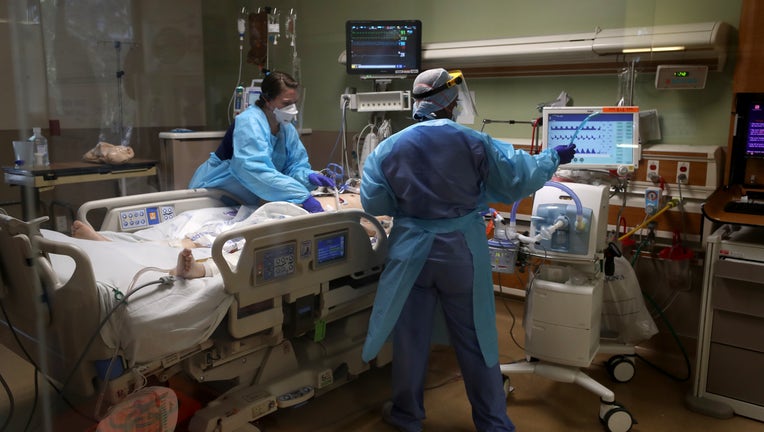Florida hospitals beg feds for more drugs as virus cases rise

FILE - Nurses care for a coronavirus COVID-19 patient in the intensive care unit (I.C.U.) at Regional Medical Center on May 21, 2020 in San Jose, California.
FORT LAUDERDALE, Fla. - Florida hospitals said they are in desperate need of a life-saving medication to help treat the coronavirus patients rapidly filling their beds as cases across the state continue to rise at alarming rates.
Florida hospitals met with White House officials last week, outlining the critical need for more remdesivir. The treatment has been shown to reduce illness severity and mortality in some patients with COVID-19, said Crystal Stickle, interim president of Florida Hospital Associations, which represents over 200 hospitals.
Within 48 hours, federal health officials sent more than 17,000 vials to the state, but hospitals say it’s not enough. They want an expedited shipment of the drug and a new distribution process to avoid backlogs they say can mean life or death in some cases.
“This initial shipment did not meet the incredible need we have for this live-saving drug,” Stickle said in a statement Saturday.
Florida’s hospitals are currently caring for more than 9,000 COVID-19 patients, and more than 20 percent of those require intensive care, according to the hospital association. The state Department of Health on Saturday reported 10,292 new confirmed cases of coronavirus and 90 more deaths. Overall, there have been nearly 338,000 cases resulting in 5,002 deaths.
Hospitalizations for the coronavirus, which have tapped out intensive care units of some hospitals around the state, continued to rise though not quite as steeply as in many of the days of the past week. As of late Saturday morning, there were 9,164 hospitalizations compared with 8,886 at the same time Friday. Hospitals in the Miami, Tampa, Orlando and Jacksonville areas have seen surges in the past week.
RELATED: Tracking coronavirus: Florida adds over 10,300 new cases, 90 additional deaths
Hundreds of studies are underway, testing existing medicines and experimental ones. So far, only one -- a common steroid called dexamethasone -- has been shown to increase survival. Remdesivir, an antiviral medicine administered over five days, has been shown to shorten hospitalization by about four days on average.
Details of the government-led remdesivir study have not yet been published, but researchers are eager to see how many patients received other drugs such as steroids and hydroxychloroquine.
Lee Health, a hospital system in Fort Myers, is rationing the drug to “priority one” patients, usually 10 to 12 patients a day. Ideally, they’d like to give the drug to an additional 15 to 20 patients if they had enough, said John Armitstead, the system director for the hospital’s pharmacy.
“We can probably give it to about half the patients we’d like to give it to roughly,” he said Saturday. “There’s a relative shortage and that’s always difficult because then you’re deciding which patient does not get remdesiriv.”
Armistead, who is also a pharmacist, stressed the drug is not curative and is still an investigational drug lacking FDA approval, but called it “the best antiviral we have” against COVID-19.
Republican Florida Gov. Ron DeSantis said Saturday that after working with Vice President Mike Pence, the state is getting another 30,000 vials of the medicine that will be shipped directly to hospitals in the next 48 to 72 hours. The shipment should treat about 5,000 patients.
The announcement came during a discussion with doctors at a St. Augustine hospital.
“When we got word that it was running low, we were able to get another shipment expedited that arrived last Saturday,” DeSantis said. “But then you had other hospitals saying, ‘This is good, but we’re going to need more before the next shipment is scheduled to arrive.’”
Meanwhile, DeSantis faces mounting criticism over his handling of the virus. The Republican governor and ally of President Donald Trump has downplayed the fact that Florida has become a hot bed, saying other regions from Southern California to South Carolina have seen similar increases.
Critics have questioned why the governor hasn’t issues a statewide mask ordinance. DeSantis has said the decision is best left to local governments because Florida is such a diverse state.

Florida listed among 18 ‘red zone’ states
In a new White House document, health officials list Florida as one of 18 red zone states that should consider closing gyms and issuing statewide mask mandates.
A recent Fox News poll showed DeSantis’ approval rating sliding to 53%, a six-point drop from April. The percentage of Floridians who viewed him unfavorably, meanwhile, grew from 33% in April to 40% last month. This week, he released a polished two-minute video on social media that had the sheen of a political campaign ad aimed at burnishing his image.
The criticism has increased as the state’s hardest hit areas are increasing restrictions, cracking down on mask use and instating curfews to help reduce the spread.
When asked by a reporter Saturday if there was anything to that would change his mind about a statewide mask mandate, DeSantis said hard hit counties like Miami-Dade and Broward already have mandates in place.
RELATED: DeSantis says it 'doesn't make sense' to close gyms
“They’ve had compulsory mandates in place since April. So that’s actually been in place. But we’re doing advisory and we’re not going to be prosecuting people,” he said.
Miami-Dade County said it will start enforcing rules designed to combat the rapidly spreading coronavirus more aggressively. Earlier this week, the Miami-Dade County Commission unanimously approved an emergency order that gives code and fire inspectors authority to issue tickets of up to $100 for individuals and $500 for businesses not complying with guidelines to wear masks and practice social distancing. Police already had this power.
In neighboring Broward County, officials announced a curfew Friday that bans most people from being outside from 11 p.m. to 5 a.m. at least through Aug. 1 and an order limiting private gatherings, indoor or outdoor, to no more than 10 people.

